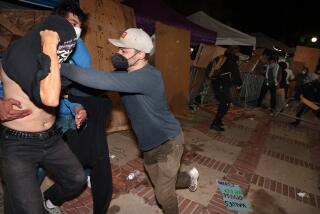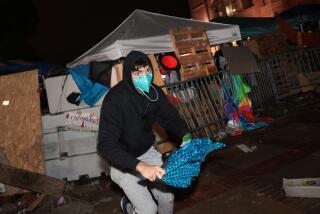Since shootings, area Muslims fear unfounded suspicions and reprisals

Salma Mahmoud was walking across a dimly lighted section of the UC Riverside campus on a recent weeknight when a man approached and spit out the word “ISIS.” Video by Allen J. Schaben / Los Angeles Times
- Share via
Trying to stay focused during finals week hasn’t been easy for Salma Mahmoud, who was walking across a dimly lighted section of the UC Riverside campus on a recent weeknight when a man approached and spit out the word “ISIS.”
“I reported the incident as a hate thing to the campus police,” said Mahmoud, 18, who wears a hijab. “The person I reported it to turned to other officers standing nearby and said, ‘I expected this.’”
------------
FOR THE RECORD
Southern California Muslims: A front-page article in the Los Angeles Times published Dec. 12 about Southern California Muslims keeping a low profile for fear of reprisal after the massacre at the Inland Regional Center in San Bernardino incorrectly attributed a quote. Ahlam Muhtaseb, a professor at Cal State San Bernardino, not Tina Aoun, director of the Middle Eastern Student Center at UC Riverside, said: “Many of my Muslim friends, among others, have doubts about the FBI’s narrative of what happened. That’s because the story has so many holes in it. It doesn’t make any sense. Why did the FBI and police release the crime scene in the house in Redlands only one day after the shooting? Why would terrorists have a baby? Why would they target a facility for children with disabilities?”
------------
Mahmoud, in an interview, held up her iPhone to display a shocking image making the rounds on Twitter: a dozen severed pig heads lined up in a row across a two-lane highway. The caption under it read, “I’m taking action in my own hands. No Muslims up my street …”
I feel condemned for something I didn’t do. So, now, yes, I only get gasoline in the daytime.
— Abdul Ali, volunteer handyman at a mosque
“The political climate has become so dangerous that we could be attacked,” she said, shaking her head.
Her experiences reflect the transforming effects of the San Bernardino massacre on Muslims as they live and work beside fellow Americans across Southern California.
Their concerns were heightened Friday when authorities said they were investigating a fire that erupted shortly after noon in the lobby of the Islamic Society of the Coachella Valley mosque. Firefighters were able to contain the blaze to the lobby, but smoke caused damage throughout the 1,800-square-foot mosque, a spokeswoman for the Riverside County Fire Department said. The FBI is now assisting in the investigation to help determine whether the fire involved was a deliberate attack, said Laura Eimiller, an FBI spokeswoman.
Immediately after last week’s massacre at the Inland Regional Center, Islamic Ieaders flooded their social media venues with lists of do’s and don’ts developed after Sept. 11, 2001, to help Muslims cope with the prying eyes of government and increasingly negative views of their faith arising from fears of terrorism.
Check your surroundings. Do not stay out late alone at night. Buy Mace. Inform loved ones of where you are going and when you will be back.
But Muslims say those recommendations are no longer sufficient in the wake of the attack by a seemingly quiet couple with a baby — and the heated political rhetoric that followed.
They worry that even friends and neighbors they have known for years who are not Muslim will begin viewing them with suspicion.
“The situation is such that even being married and having a child means nothing now — you will still be suspect,” said Fatima Dadabhoy, a senior attorney at the Council on Islamic-American Relations office in Anaheim. “Obvious anti-Muslim sentiments are easier to deal with than the person who will be smiling in your face, and wondering whether or not you are a terrorist.”
Dadahboy, author of a recent study documenting bias-based bullying of Muslim students in California schools, said Muslims’ behavior is changing.
“It could be by not going out driving because we’ve seen women wearing hijabs getting yelled at, or sideswiped on the road. Or, it could mean pasting American flag stickers on your car bumper, or hanging a flag prominently over your front door,” Dadahboy said.
Hanif Mohebi, a spokesman for the CAIR office in San Diego, has been recommending that Muslims “open lines of communication with people. For example, invite your neighbor over for a barbecue.”
“Given what happened, I don’t blame some people for being unsure and wondering, ‘Hey, what’s going on with my neighbor? Is he a terrorist or not?’” Mohebi said. “It’s no fun listening to people talking trash, but I honestly believe that opening lines of communication will solve a majority of the problem.”
Other Muslims are taking different approaches.
“I don’t go shopping for food or clothing unless I have a friend or two with me,” said Roshan Zamir Abbassi, an assistant imam at the Dar Al Uloom Al Islamiyah of America mosque in San Bernardino who was interviewed by federal authorities after the shooting.
“The statements of people like Donald Trump are adding to the discomfort of all minorities,” Abbassi, 24, said, referring to the GOP front-runner’s call for a temporary ban on Muslims entering the United States. “These people have a message of hate.”
Abdul Ali, 40, a volunteer handyman at the mosque, interjected, “I feel condemned for something I didn’t do. So, now, yes, I only get gasoline in the daytime.”
Because of the spelling of her first name, Syeda Jafri, spokeswoman for the Rialto Unified School District, has been asked if she knew Syed Rizwan Farook, 28, and his wife Tashfeen Malik, 29, who were killed in a gunbattle with police shortly after the shootings. And because of her faith, she has been asked, “Do you feel responsible for what happened?”
“It’s a tragedy that the distortion of Islam is being so boldly manipulated by a few,” she said. “It is disheartening that I find I have to reeducate even my closest friends about the honest, sincere and genuine teachings of Islam: Accept differences, love all mankind.”
“We will overcome this hysteria and Islamophobia through education,” she added.
Some Muslims are even questioning the veracity of the evidence presented by law enforcement authorities — or rejecting it outright, said Tina Aoun, director of the Middle Eastern Student Center at UC Riverside.
“Many of my Muslim friends, among others, have doubts about the FBI’s narrative of what happened,” said Aoun, who is not Muslim. “That’s because the story has so many holes in it. It doesn’t make any sense.”
“Why did the FBI and police release the crime scene in the house in Redlands only one day after the shooting?” Aoun said. “Why would terrorists have a baby? Why would they target a facility for children with disabilities?”
Mahmoud, a political science major who was born in Dubai, United Arab Emirates, said, “Nothing about what happened is fair. It wasn’t fair for the people who got shot. It wasn’t fair for the child whose parents were terrorists. It isn’t fair for ignorant people to target Muslims.”
Nor is it fair, she said, for Muslims to be forced to keep a low profile.
“I had big plans for winter break — I was planning to go to Hollywood with friends,” she said. “But now, I’m worried. So, I’ll probably stay home and watch Netflix. It’s a compromise I’m willing to make if it means being safe.”
Twitter: @louissahagun
MORE ON SAN BERNARDINO
Amid Farook family violence, brothers were a study in contrasts
San Bernardino may change minds on police use of surplus military equipment
Hear the first moments after the attack: ‘We have an active shooter--we need entry now’
More to Read
Sign up for Essential California
The most important California stories and recommendations in your inbox every morning.
You may occasionally receive promotional content from the Los Angeles Times.











